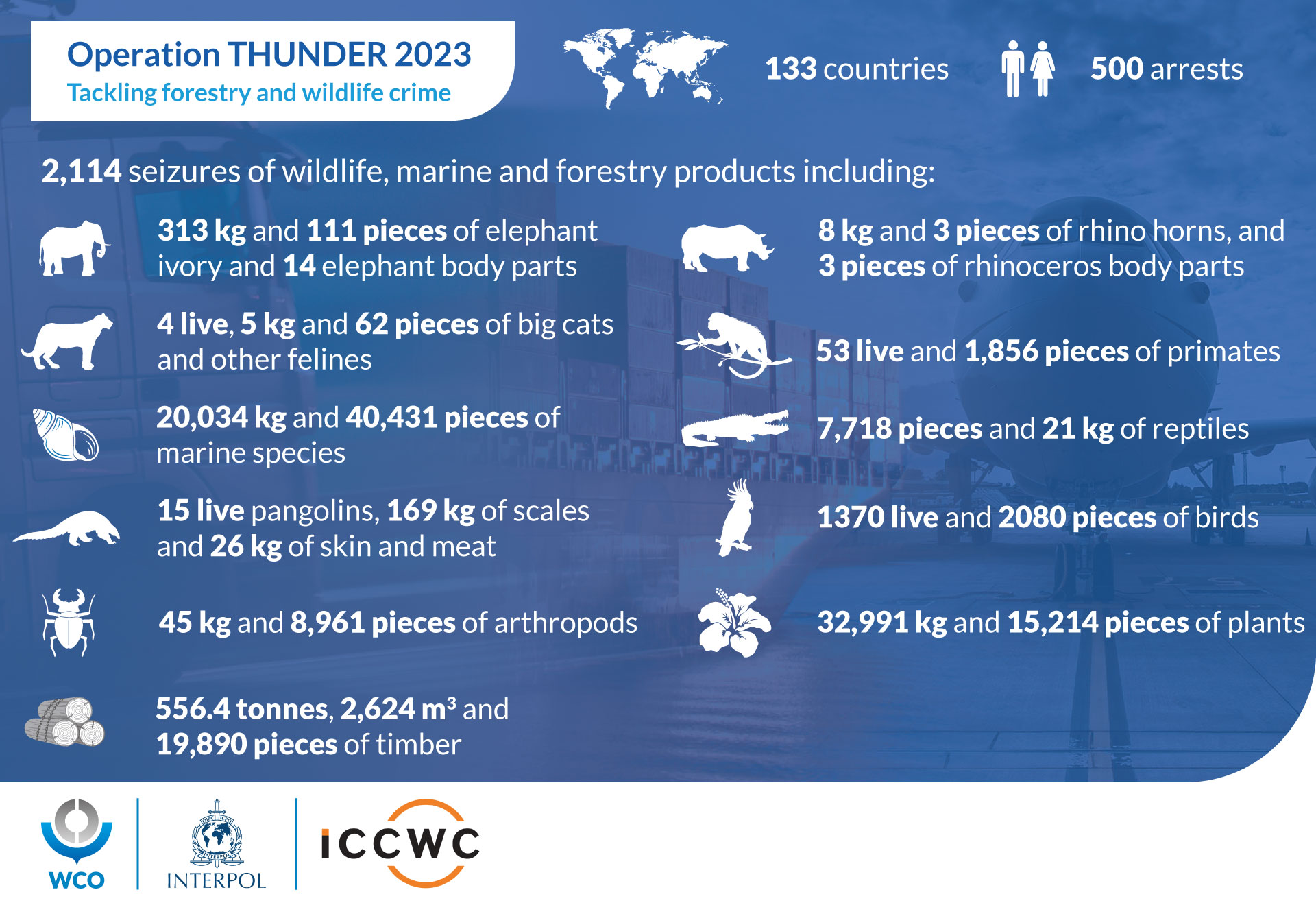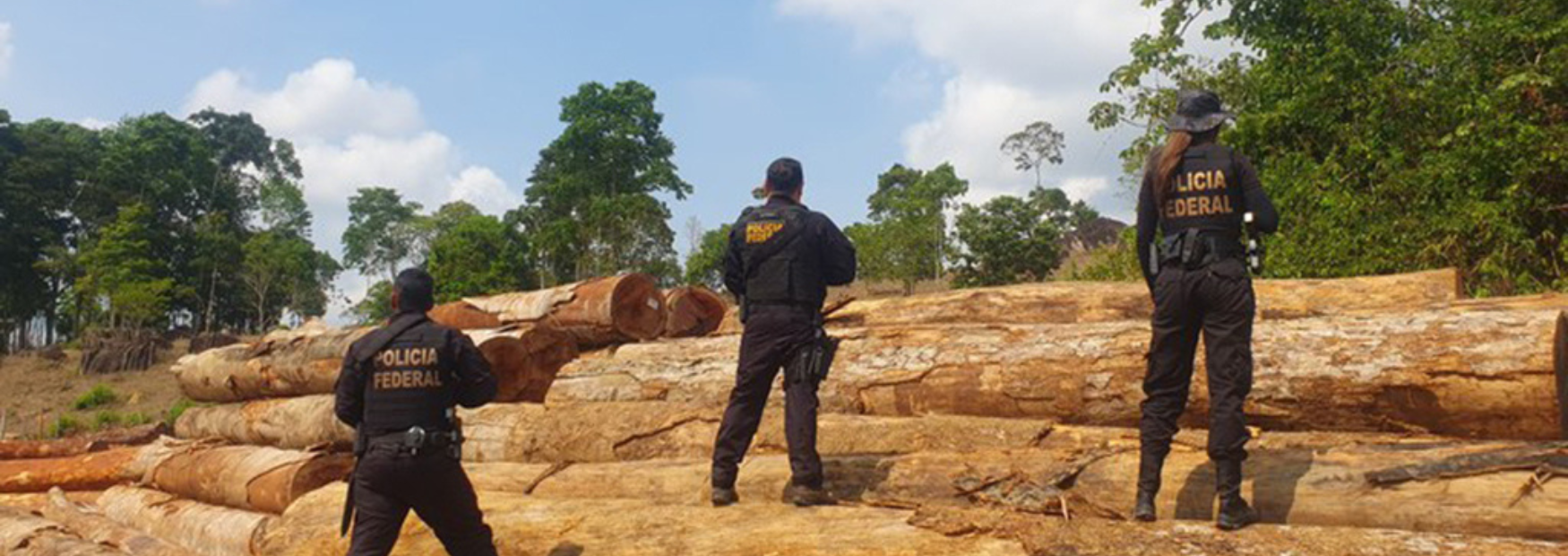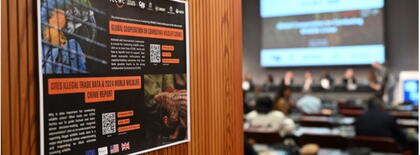Originally published by INTERPOL and WCO.
Operation Thunder 2023: 2,114 seizures of endangered animals and timber in major international law enforcement operation
Endangered animals including elephants, rhinos and pangolins, as well as protected timber, particularly tropical hardwoods, have been seized in a joint INTERPOL - World Customs Organization (WCO) operation to stop wildlife and timber trafficking.
From 2 – 27 October, customs and police officers coordinated some 500 arrests worldwide and more than 2,000 confiscations of animals and plants that are protected under the Convention on International Trade in Endangered Species of Wild Fauna and Flora (CITES) due to their threatened status. Any trade performed in breach of CITES is illegal.
The global operation, named Operation Thunder, involved police, customs, border control, environment, wildlife and forestry officials in 133 countries who worked together across borders. This marked the highest participation rate in Operation Thunder since the annual law enforcement campaign was launched in 2017.

Among the 2,114 seizures were more than 300kg of ivory, thousands of turtle eggs, 30 tons of plants, dozens of big cat body parts and rhino horns, as well as primates, birds and marine species.
Authorities also confiscated 2,624 cubic meters of timber which is equivalent to 440 standard shipping containers.
Although Operation Thunder 2023 results are still coming in, initial data has enabled police and customs to identify some clear trends:
- 60 per cent of wildlife trafficking cases were linked to transnational organized crime groups, operating along routes also known for smuggling other illegal products.
- Protected reptiles and marine life are being exploited for luxury brand fashion.
- Online sales platforms are still being used to sell wildlife, timber and marine goods.
- Illegal and legal timber are blended for transport to make it difficult to detect illegally logged wood.
- Transnational organized crime groups resort to high levels of document fraud, particularly the use of forged certifications and CITES permits and permit reuse.

INTERPOL Secretary General Jürgen Stock said:
“Important and endangered animals, birds and plants are being put at risk of extinction by wildlife and timber traffickers. These appalling crimes not only deprive the world of unique animals and plants but also countries of their natural assets and resources.
“The costs to communities are even greater, because as this Operation shows, almost all environmental crime has links to other forms of crime including violence, corruption and financial crime, but also has strong links to transnational organized crimes groups.
“As the world grapples with the devastating consequences of environmental degradation and species extinction, INTERPOL and WCO are emerging as leaders in safeguarding biodiversity and world security.”
WCO Secretary General Dr Kunio Mikuriya said:
“As part of a comprehensive strategy, customs plays a pivotal role in disrupting criminal networks involved in the illegal wildlife trade. This is achieved by enforcing strict controls at borders, effectively closing off avenues for exploitation and financial gain available to traffickers.”
“At the forefront of this strategy, customs employees intelligence-sharing, championing collaboration, and adopting technological advancements. These measures are crucial to stay one step ahead of criminals, thereby ensuring that customs' contribution to combating wildlife crime is dynamic, responsive and adaptive.”
INTERPOL and the WCO shared intelligence, coordinated investigations and pooled their resources to enable frontline police and customs officers to target, identify and arrest traffickers, including those operating online, as they tried to smuggle animals or timber across borders.
Known traffickers wanted through INTERPOL's Red Notice alert system were identified ahead of operations and were subsequently targeted when crossing borders.
Hundreds of vehicles, including cars, trucks, and cargo ships, were searched at checkpoints across all regions. Specialized sniffer dogs and X-ray scanners were deployed to detect hidden wildlife and camouflaged timber shipments. Hundreds of parcels, suitcases, vehicles, boats and cargo transporters were examined as they are often used to conceal transported wildlife species.
CITES Secretary General Ivonne Higuero said:
“The results of Operation Thunder 2023 again show that strong and coordinated responses between parties are crucial to tackle transnational criminal networks involved in wildlife crime.
“Well targeted, unified and coordinated efforts such as those mobilized through this global operation are exactly what is needed to overcome the threat posed by wildlife crime.”

Note to Editors:
About Operation Thunder 2023:
Now in its seventh year, Operation Thunder is a joint operation coordinated annually by INTERPOL and the WCO with the backing of CITES and the International Consortium on Combating Wildlife Crime.
Thunder operations are funded by the European Commission's Directorate General for International Partnerships, Norway's International Climate and Forest Initiative, the US Agency for International Development and the UK's Department for Environment, Food and Rural Affairs.
About ICCWC:
The International Consortium on Combating Wildlife Crime (ICCWC) is a unique partnership of five intergovernmental organizations to help law enforcement bring criminals engaged in wildlife crime to justice. Through technical assistance, tools, training, and operational support, ICCWC works along the entire criminal justice chain, building the capacity of frontline law enforcement in countries and regions around the world affected by wildlife crime. The ICCWC partners are the Secretariat of the Convention on International Trade in Endangered Species of Wild Fauna and Flora (CITES), the International Criminal Police Organization (INTERPOL), the United Nations Office on Drugs and Crime (UNODC), the World Bank Group (WBG) and the World Customs Organization (WCO).
Connect with ICCWC:



